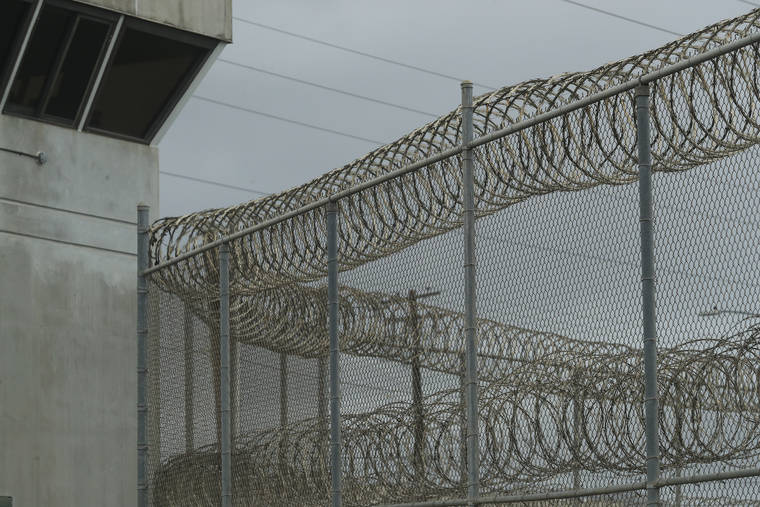Editorial: Release some inmates so that prisons don’t become a haven for coronavirus

JAMM AQUINO / JAQUINO@STARADVERTISER.COM
The Oahu Community Correctional Center (OCCC) is seen on Wednesday. Chief Justice Mark Recktenwald has directed some Hawaii judges to work with police and prosecutors to identify inmates who can be quickly released to reduce the population in Hawaii’s packed jails. It’s an effort to prevent the coronavirus spread among prisoners and staff.
Hawaii’s jails and prisons are horribly overcrowded by any definition. With threats that a highly contagious disease could spread easily, they become a public health danger — to those in custody, of course, but to the broader community as well.
This is a concern for a whole nation in the throes of the global coronavirus Opens in a new tabpandemic Opens in a new tab, and for Hawaii, too.
Chief Justice Mark Recktenwald has rightly concluded that the state must take precautions with its correctional system, and has asked stakeholders to find ways to reduce the populations in jails, largely the detainees being held before trial. He has tasked judges in all circuits to discuss with prosecutors and public defenders on which people could be released early, and how, keeping in mind public safety.
This is an imperative that should be developed and implemented with full public disclosure and the rationale explained.
Recktenwald took that step in response to a call by the new Hawaii Correctional Systems Oversight Commission to address the issue of safety in correctional facilities.
In a separate matter, the state Supreme Court also was petitioned by the Office of the Public Defender, seeking a population reduction in two categories of sentenced prison inmates: those serving sentences up to 1-1/2 years in length as a condition of gaining a felony probation; and those convicted of misdemeanors and petty misdemeanors who are serving District Court sentences.
Don't miss out on what's happening!
Stay in touch with breaking news, as it happens, conveniently in your email inbox. It's FREE!
On that front, a decision may be made on how to proceed after written responses come in from the counties’ prosecuting attorneys and the state attorney general, said Jan Kagehiro, Judiciary spokeswoman; those responses are due today.
This is a matter of more urgency than some may realize. The fact is that many do not consider the interests of jail detainees and prison inmates to be their own. But, in fact, they are.
From the humanitarian standpoint, these are members of the community, with families on the outside, for whom the state is directly responsible. It’s the duty of the Judiciary and the state Department of Public Safety to keep those incarcerated in humane conditions. The fact that the state’s facilities fall short of that mark has been the driver behind federal legal complaints against the correctional system over the years.
But from the public-health perspective, crowded jails and prisons simply do not allow for social distancing, and if the coronavirus infects someone within it — staff as well as the incarcerated — the spread could get out of hand quickly. The exposure could affect health-care workers, corrections officers and essential others entering and exiting the facilities, and then move to the larger community.
The time to get a handle on it is now, before there’s a hint of a problem.
The Department of Public Safety has issued its own plan on controlling conditions to the extent possible within its facilities as currently configured. Visits by family members and friends have been suspended, as has access by volunteers supporting the prisoners, to curtail the risk of disease exposure. Vendors will be allowed in but will undergo enhanced screening.
Some compensations, such as increasing the duration of prisoner phone calls, are being added to offset the loss of contact, officials said.
Cleaning is increasing, and mealtimes are being staggered to give inmates more space, with more allowances for eating meals in cells, all in the interest of social distancing.
All of this is necessary but, without a population reduction, insufficient. Other states have begun releasing those who can rejoin the community safely, so that prisons don’t become a haven for the virus.
Hawaii should follow suit, with utmost care but without delay.



